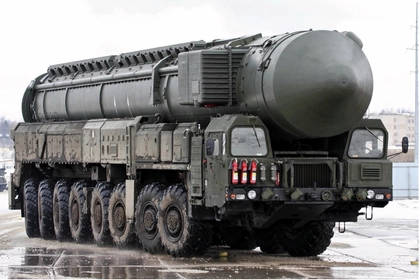Since Thursday there have been rumors that the Biden administration could return nuclear weapons Ukraine gave up in the 1990s as a form of deterrence against Russia continuing its invasion.
However, Kyiv Post ascertained that it was an extrapolation of a groundless claim made by some US officials cited by the New York Times.
JOIN US ON TELEGRAM
Follow our coverage of the war on the @Kyivpost_official.
What exactly did the officials say?
A New York Times article published on Thursday, Nov. 21, titled “Trump’s Vow to End the War Could Leave Ukraine With Few Options,” discussed Western options to help Kyiv defend itself ahead of Donald Trump’s return to office.
In one paragraph, the publication said unnamed officials “suggested” that US President Joe Biden could return the nukes Ukraine relinquished in the 1990s under the Budapest Memorandum. Here’s the full paragraph:
“Several officials even suggested that Mr. Biden could return nuclear weapons to Ukraine that were taken from it after the fall of the Soviet Union. That would be an instant and enormous deterrent. But such a step would be complicated and have serious implications.”
As such, it was merely a suggestion made by unnamed officials, not Biden himself. Moreover, Washington does not possess the nukes Ukraine gave up in the 1990s, which would render the option impossible.
Where did Ukraine’s nukes go?
To Russia. Ukraine gave Russia its nukes in the 1990s in exchange for security guarantees that were subsequently violated.

Ukrainian Cadet Plots to Adjust Russian Strikes on Classmates for Money – SBU
A 1999 publication on nuclear disarmament, citing a White House fact sheet, said Ukraine was believed to have possessed 1,900 strategic nuclear weapons as of January 1994 after the fall of the USSR a few years prior – an arsenal that rivaled and even exceeded most nuclear-capable nations. However, it is believed that Moscow retained control over those weapons despite their being in Ukraine.
Ukraine ultimately transferred its nuclear arsenals to Russia in exchange for 100 tons of nuclear reactor fuels from Moscow and security guarantees from London, Washington and Moscow. Ukraine’s nuclear disarmament was completed by 1996.
“After some more posturing and delay, the first strategic warheads were loaded on a special train in the last days of February and shipped out of Ukraine in early March 1994. By November 1994, Russia had taken 400 strategic nuclear warheads from Ukraine. By 1 June 1996 all strategic nuclear weapons had been removed from Ukraine,” read the 1999 publication.
Budapest Memorandum
While the US was one of the signatories of the Budapest Memorandum that saw Ukraine relinquishing its nuclear arsenal, none of them made it to the US according to existing records.
The Budapest Memorandum on Security Assurances is an international agreement aimed at addressing concerns from Ukraine over security and territorial integrity upon nuclear disarmament.
It was signed on Dec. 5, 1994, between Ukraine, the US, the UK and Russia against the backdrop of global arms control after the Cold War, with then-US President Bill Clinton calling the world a “safer place” after signing the memorandum.
Donald M. Blinken, father of current US Secretary of State Antony Blinken, was also in attendance as the US ambassador to Hungary at the time.
The document signified the former Soviet state’s accession to the Treaty on the Non-Proliferation of Nuclear Weapons as a non-nuclear-weapon state after a series of talks as Ukraine sought guarantees and compensation for giving up its nuclear stockpile.
Here are the six points outlined in the original document:
- The United States of America, the Russian Federation, and the United Kingdom of Great Britain and Northern Ireland, reaffirm their commitment to Ukraine, in accordance with the principles of the CSCE [Commission on Security and Cooperation in Europe] Final Act, to respect the Independence and Sovereignty and the existing borders of Ukraine.
- The United States of America, the Russian Federation, and the United Kingdom of Great Britain and Northern Ireland, reaffirm their obligation to refrain from the threat or use of force against the territorial integrity or political independence of Ukraine, and that none of their weapons will ever be used against Ukraine except in self-defense or otherwise in accordance with the Charter of the United Nations.
- The United States of America, the Russian Federation, and the United Kingdom of Great Britain and Northern Ireland, reaffirm their commitment to Ukraine, in accordance with the principles of the CSCE Final Act, to refrain from economic coercion designed to subordinate to their own interest the exercise by Ukraine of the rights inherent in its sovereignty and thus to secure advantages of any kind.
- The United States of America, the Russian Federation, and the United Kingdom of Great Britain and Northern Ireland, reaffirm their commitment to seek immediate United Nations Security Council action to provide assistance to Ukraine, as a non-nuclear-weapon State Party to the Treaty on the Non-Proliferation of Nuclear Weapons, if Ukraine should become a victim of an act of aggression or an object of a threat of aggression in which nuclear weapons are used.
- The United States of America, the Russian Federation, and the United Kingdom of Great Britain and Northern Ireland, reaffirm, in the case of Ukraine, their commitment not to use nuclear weapons against any non-nuclear-weapon State Party to the Treaty on the Non-Proliferation of Nuclear Weapons, except in the case of an attack on themselves, their territories or dependent territories, their armed forces, or their allies, by such a state in association or alliance with a nuclear weapon state.
- The United States of America, the Russian Federation, and the United Kingdom of Great Britain and Northern Ireland will consult in the event a situation arises which raises a question concerning these commitments.
You can also highlight the text and press Ctrl + Enter










